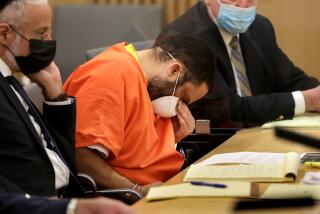Conviction in Murders of Two CHP Officers 10 Years Ago Is Overturned
- Share via
REDWOOD CITY — As a handful of California Highway Patrol officers looked on, a Superior Court judge here ordered a new trial Friday for a man who was sentenced to death in the 1978 murders of two highway patrolmen.
Retired Judge Joseph Karesh, sitting by special assignment in the San Mateo County courthouse, overturned Luis Rodriguez’s murder conviction after concluding that a juror committed “deliberate and egregious misconduct” by reenacting part of the drive that Rodriguez, 33, would have taken on the night of the murders.
“Jury impartiality was affected by the misconduct and the misconduct lightened the prosecution’s burden of proof,” Karesh said, reading his decision in court.
Rodriguez smiled and whispered to one of his lawyers, Karen Snell, “You did a great job.” He will remain at San Quentin prison while he awaits a new trial or the outcome of a possible appeal of Friday’s order by Yolo County Dist. Atty. David Henderson.
Rodriguez could face another death sentence. But Henderson said “at a minimum, it will be difficult” to retry the case 10 years after the crime. Henderson can appeal the ruling but would not reveal his plans.
Rodriguez has been on Death Row since his 1981 conviction in the murders of Roy Blecher, 50, and William Freeman, 35. The patrolmen were shot to death, apparently with their own guns, near Interstate 80 early on Dec. 22, 1978.
“What reaction would you have?” said one of the CHP officers who had watched the proceedings.
The ruling came nearly two years after the state Supreme Court, under then-Chief Justice Rose Elizabeth Bird, affirmed virtually all of Rodriguez’s case, including his sentence of death.
Jury at Impasse
The court, however, sent the case back to Karesh, the trial judge, to correct what seemed to be a minor oversight: the judge did not formally hear Rodriguez’s motion for a reduced sentence.
While the case awaited Karesh’s ruling, Snell and defense attorney Dennis Riordan investigated the jury deliberations, which had spanned 34 days. Jurors had sent several notes to Karesh insisting that they were at an impasse.
The first juror located by Snell told how he reenacted a part of the drive from Crockett to Sacramento that Rodriguez was supposed to have taken on the night of the shootings. The time it took to drive the stretch of Highway 80 was important evidence because it could have either placed him at the crime scene or cleared him.
Snell said juror Shelby O. Martin told of bringing the information to the attention of other jurors. Finally, the sole hold-out relented and the jury went on to direct that Rodriguez be sentenced to death. Jurors are not supposed to conduct their own investigations and must base their decisions on evidence produced in court.
“It’s not a new rule. It’s not a technicality. This man never got a fair jury trial. It’s as serious as if a juror accepted a bribe,” Riordan said. He added, however, that given the deaths of two patrolmen, “this is not a happy day.”
Rodriguez testified that he drove past the murder site before the killings but was not responsible for the killings. At the murder scene, investigators found his temporary driver’s license. Witnesses against him said he often told of his hatred of police and how he would kill any who tried to arrest him.
Rodriguez’s girlfriend, Margaret Klaess, said officers stopped Rodriguez, who was driving a stolen car, and testified that she heard shots. She pleaded guilty to being an accessory to murder and was released from prison after serving three years.
More to Read
Sign up for Essential California
The most important California stories and recommendations in your inbox every morning.
You may occasionally receive promotional content from the Los Angeles Times.









